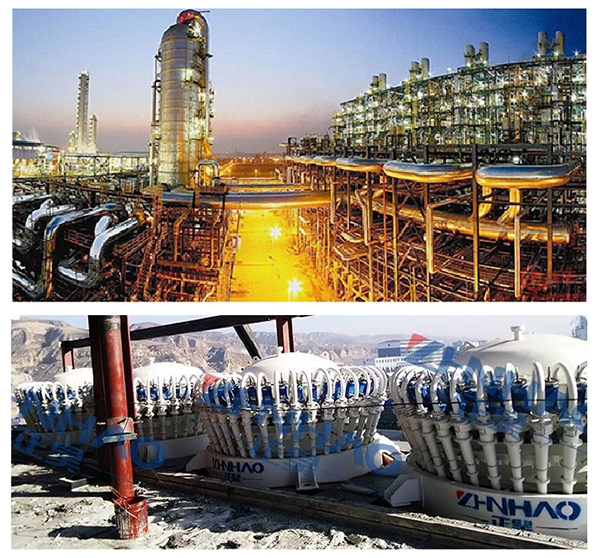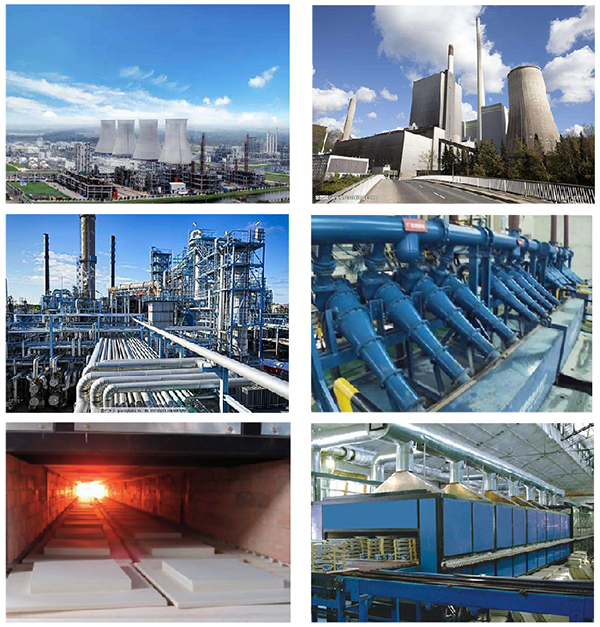- ADVANTAGES OF REACTION BONDED SILICON CARBIDE
Reaction Bonded Silicon Carbide (RBSC, or SiSiC) products offer extreme hardness/abrasion resistance and outstanding chemical stability in aggressive environments. Silicon Carbide is a synthetic material that exhibits high performance characteristics including:
l Excellent chemical resistance.
The strength of RBSC is almost 50% greater than that of most nitride bonded silicon carbides. RBSC is the excellent corrosion resistance and antioxidation ceramic.. It can be formed into a variety of desulpurization nozzle (FGD) .
l Excellent wear and impact resistance.
It is pinnacle of large scale abrasion resistant ceramic technology. RBSiC have high hardness approaching that of diamond. Designed for use in applications for large shapes where refractory grades of silicon carbide are exhibiting abrasive wear or damage from impact of large particles. Resistant to direct impingement of light particles as well as impact and sliding abrasion of heavy solids containing slurries. It can be formed into a variety of shapes, including cone and sleeve shapes, as well as more complex engineered pieces designed for equipment involved in the processing of raw materials.
l Excellent thermal shock resistance.
Reaction bonded silicon carbide components provide outstanding thermal shock resistance but unlike traditional ceramics, they also combine low density with high mechanical strength.
l High strength (gains strength at temperature).
Reaction bonded Silicon carbide retains most of its mechanical strength at elevated temperatures and exhibits very low levels of creep, making it the first choice for load-bearing applications in the range 1300ºC to 1650ºC (2400ºC to 3000ºF).
- Technical Data-sheet
|
Technical Datasheet |
Unit |
SiSiC (RBSiC) |
NbSiC |
ReSiC |
Sintered SiC |
|
Reaction Bonded Silicon Carbide |
Nitride Bonded Silicon Carbide |
Recrystallized Silicon Carbide |
Sintered Silicon Carbide |
||
|
Bulk density |
(g.cm3) |
≧ 3.02 |
2.75-2.85 |
2.65~2.75 |
2.8 |
|
SiC |
(%) |
83.66 |
≧ 75 |
≧ 99 |
90 |
|
Si3N4 |
(%) |
0 |
≧ 23 |
0 |
0 |
|
Si |
(%) |
15.65 |
0 |
0 |
9 |
|
Open Porosity |
(%) |
<0.5 |
10~12 |
15-18 |
7~8 |
|
Bending strength |
Mpa / 20℃ |
250 |
160~180 |
80-100 |
500 |
|
Mpa / 1200℃ |
280 |
170~180 |
90-110 |
550 |
|
|
Modulus of elasticity |
Gpa / 20℃ |
330 |
580 |
300 |
200 |
|
Gpa / 1200℃ |
300 |
~ |
~ |
~ |
|
|
Thermal conductivity |
W/(m*k) |
45 (1200℃) |
19.6 (1200℃) |
36.6 (1200℃) |
13.5~14.5 (1000℃) |
|
Confficient of thermal expansion |
Kˉ1 * 10ˉ6 |
4.5 |
4.7 |
4.69 |
3 |
|
Mons' hardness scale (Rigidity) |
9.5 |
~ |
~ |
~ |
|
|
Max-working temparature |
℃ |
1380 |
1450 |
1620 (oxid) |
1300 |
- Industry Case For Reaction Bonded Silicon Carbide:
Power Generation, Mining, Chemical, Petrochemical, Kiln, Machinery manufacturing industry, Minerals & Metallurgy and so on.
However, unlike metals and their alloys, there are no standardized industry performance criteria for silicon carbide. With a wide range of compositions, densities, manufacturing techniques and company experience, silicon carbide components can differ drastically in consistency, as well as mechanical and chemical properties. Your choice of supplier determines the level and quality of the material you receive.

